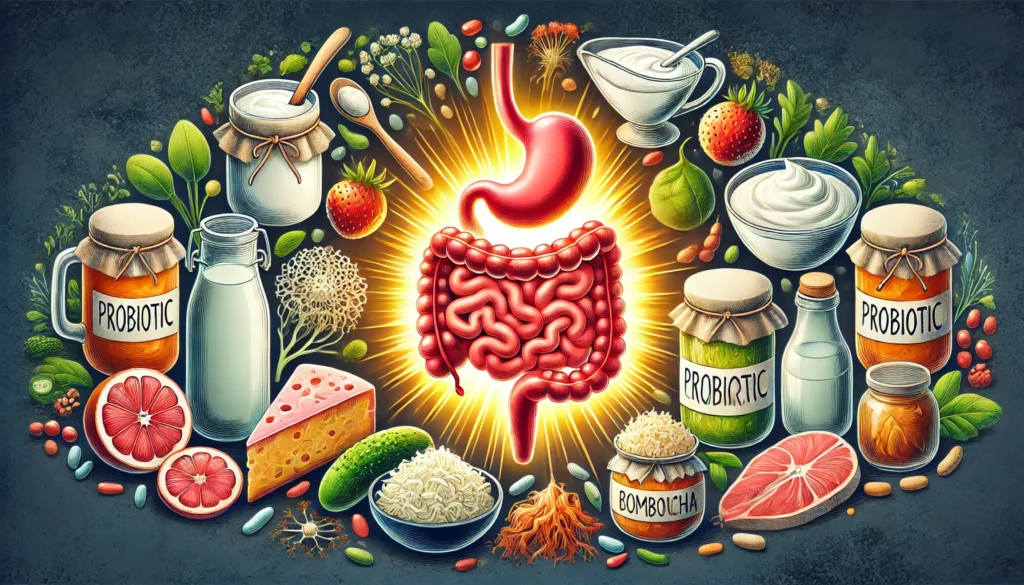Understanding Probiotics and Their Role in Health
Probiotics are living microorganisms that confer a range of health benefits when consumed in adequate amounts. These beneficial bacteria and yeasts primarily support gut health, but their influence extends far beyond digestion. Research has shown that probiotics contribute to immune system regulation, mental well-being, and even cardiovascular health. Given their widespread influence on human physiology, many people seek to optimize their probiotic intake to maximize effectiveness. A common question that arises is: when is it best to take probiotics? This guide will explore the best timing for probiotic supplementation based on scientific evidence, ensuring that you get the most from these beneficial microorganisms.
You may also like: How to Improve Gut Health Naturally: Science-Backed Tips for a Stronger Microbiome
The Science Behind Probiotic Effectiveness
Probiotic efficacy is influenced by several factors, including the strain of bacteria, dosage, storage conditions, and, most importantly, the timing of consumption. The human gastrointestinal tract is a dynamic environment, and the survival of probiotic bacteria depends on their ability to withstand stomach acid, bile, and digestive enzymes. Understanding when to take probiotics can improve their survival rates and ensure that they reach the intestines, where they exert their benefits.
Should Probiotics Be Taken with Food?
One of the most frequently asked questions about probiotics is whether they should be taken with food. Studies suggest that taking probiotics with meals, particularly those containing fat, enhances bacterial survival. The presence of food buffers stomach acid, providing a protective environment that allows more bacteria to reach the intestines. Research published in Beneficial Microbes indicates that probiotics consumed with a meal rich in healthy fats have higher survival rates compared to those taken on an empty stomach. This means that if you are wondering whether probiotics should be taken with food, the answer is generally yes, as it increases their viability.
What Is the Best Time to Take Probiotics?
Determining the best time to take probiotics depends on various factors, including individual health goals, the type of probiotic supplement, and the specific strains being used. However, scientific evidence suggests that morning and evening are both viable options. For those aiming to enhance gut health and digestion, taking probiotics with breakfast may be beneficial. Conversely, individuals looking to improve sleep quality and mental health may find evening supplementation more effective. The key is consistency—taking probiotics at the same time each day ensures that beneficial bacteria establish themselves in the gut.

The Impact of Circadian Rhythms on Probiotic Effectiveness
Circadian rhythms play a crucial role in digestive function, influencing when nutrients are best absorbed and metabolized. The gut microbiome itself follows a daily rhythm, with different microbial populations fluctuating throughout the day. Morning intake of probiotics may align with the natural activation of the digestive system, promoting efficient bacterial colonization. On the other hand, taking probiotics in the evening may support overnight gut repair and regeneration. Ultimately, the best time to take probiotics is one that aligns with your lifestyle and allows for consistent supplementation.
Probiotics for Specific Health Goals
While general guidelines suggest taking probiotics with food, specific health conditions may require tailored timing strategies:
- Digestive Health: Individuals with irritable bowel syndrome (IBS) or acid reflux may benefit from taking probiotics in the morning with breakfast.
- Mental Health and Sleep: Research shows that gut bacteria influence brain function and sleep quality. Taking probiotics in the evening may support relaxation and reduce stress levels.
- Immune Support: To bolster the immune system, consistent daily intake—whether morning or night—is recommended.
Should Probiotics Be Taken Daily?
For optimal results, probiotics should be taken daily. Unlike medications that produce immediate effects, probiotics work by gradually modifying gut microbiota composition. Regular supplementation ensures that beneficial bacteria persist in the gut, maintaining balance and supporting overall health. Clinical studies have demonstrated that consistent probiotic use is associated with better gut health, improved immune function, and enhanced mental well-being.

Frequently Asked Questions About Probiotics and Their Optimal Timing
1. What is the best time to take probiotics for maximum benefits?
The best time to take probiotics depends on individual health goals, lifestyle, and the specific strains in your supplement. Some research suggests that taking probiotics in the morning with breakfast can support digestion throughout the day, while others argue that consuming them in the evening allows for better gut colonization during sleep. Circadian rhythms also play a role, as the gut microbiome follows a daily cycle that may affect bacterial survival. Regardless of timing, consistency is key—taking probiotics at the same time each day ensures a steady influx of beneficial bacteria. If you are wondering when is it best to take probiotics, morning or evening both work, but regularity is what truly matters.
2. Should probiotics be taken with food or on an empty stomach?
Probiotics should generally be taken with food, as consuming them alongside a meal improves bacterial survival. The presence of food buffers stomach acid, protecting probiotic strains from the harsh gastric environment. Meals that contain healthy fats, in particular, provide an optimal setting for probiotic absorption, as certain bacterial strains require fat to thrive. While some manufacturers formulate probiotics with special coatings to withstand stomach acid, the majority of probiotics perform best when taken with a meal. If you have been wondering whether probiotics should be taken with food, the scientific consensus leans toward taking them alongside a meal for better effectiveness.
3. Can taking probiotics at night improve gut health while sleeping?
Yes, taking probiotics at night may have advantages, especially for individuals looking to support gut repair and microbial balance during sleep. The gut undergoes restoration processes at night, and introducing beneficial bacteria during this time may enhance their ability to colonize the intestines. Some studies suggest that taking probiotics before bed may improve digestion overnight, reduce bloating, and even support better sleep by influencing the gut-brain axis. If you are trying to determine when is it best to take probiotics, evening supplementation could be particularly beneficial for those with sleep disturbances linked to gut health. Experimenting with timing while maintaining consistency is the best approach.
4. How does meal composition affect probiotic absorption?
The composition of your meal significantly influences probiotic absorption and effectiveness. Consuming probiotics with fiber-rich foods, such as vegetables, whole grains, and legumes, provides prebiotics—compounds that serve as fuel for beneficial bacteria. Fermented foods like yogurt, kimchi, and sauerkraut also enhance probiotic activity by providing an ideal microbial environment. On the other hand, highly processed foods, excessive sugar, and artificial sweeteners can disrupt gut balance and diminish probiotic effectiveness. If you are wondering what is the best time to take probiotics, pairing them with a nutrient-dense meal rich in fiber and healthy fats ensures optimal absorption.
5. Do different probiotic strains require different timing?
Yes, different probiotic strains may require different timing strategies to maximize their benefits. Lactobacillus and Bifidobacterium strains, commonly found in digestive health supplements, generally benefit from being taken with meals. Saccharomyces boulardii, a probiotic yeast, is acid-resistant and can be taken with or without food. Soil-based probiotics (SBOs) are typically more robust and may not be as affected by stomach acid levels. If you are trying to determine when is it best to take probiotics, consider the strain-specific recommendations provided by the manufacturer or consult a healthcare professional.
6. How long does it take for probiotics to start working?
The time it takes for probiotics to produce noticeable effects varies based on individual gut health, diet, and consistency of use. Some people experience improvements in digestion, reduced bloating, or enhanced bowel regularity within a few days, while others may take several weeks to see benefits. The key is maintaining consistent intake, as probiotics need time to colonize and influence gut microbiota. If you are wondering what is the best time to take probiotics, selecting a convenient time that ensures daily use will contribute to long-term success. Results tend to become more pronounced after four to six weeks of consistent supplementation.
7. Can taking probiotics at the wrong time reduce their effectiveness?
While there is no definitive “wrong” time to take probiotics, their effectiveness can be influenced by factors such as stomach acid levels, meal composition, and supplement formulation. Taking probiotics on an empty stomach exposes them to harsh stomach acid, which may reduce bacterial survival. Conversely, taking them too close to antibiotic use can interfere with their function, as antibiotics may destroy beneficial bacteria before they establish themselves. If you are wondering when is it best to take probiotics, the best strategy is to take them at a consistent time with a meal and at least two hours apart from antibiotics if you are on medication.
8. Can I take probiotics alongside other supplements?
Yes, probiotics can be taken with other supplements, but certain combinations require strategic timing. For instance, probiotics work well with prebiotic supplements, as prebiotics provide fuel for beneficial bacteria. However, some supplements, such as high-dose zinc or certain herbal antimicrobials, may negatively impact probiotic efficacy if taken simultaneously. Additionally, calcium and iron supplements can interfere with bacterial activity, so spacing these out by a few hours is recommended. If you are wondering what is the best time to take probiotics when combining them with other supplements, taking them with meals while ensuring proper spacing from conflicting substances will maximize their benefits.
9. Are there any side effects of taking probiotics at different times?
Most people tolerate probiotics well, but some individuals may experience mild digestive symptoms when adjusting to supplementation. Taking probiotics in the morning may initially cause slight bloating as the gut microbiome adapts. Similarly, taking probiotics at night might temporarily disrupt sleep if gut fermentation increases gas production. These effects are generally short-lived and resolve as the body adjusts. If you are unsure whether probiotics should be taken with food or at a particular time, monitoring your body’s response and adjusting accordingly is a practical approach. Over time, probiotics should enhance digestion and well-being rather than cause discomfort.
10. Can probiotic timing influence mental health benefits?
Yes, probiotic timing may influence their mental health benefits, as the gut-brain axis plays a crucial role in mood regulation. Some research suggests that taking probiotics in the evening may support neurotransmitter production and improve sleep quality, which in turn enhances mood and reduces stress. Conversely, taking probiotics in the morning may provide an energy boost and support cognitive function throughout the day. If you are wondering what is the best time to take probiotics for mental well-being, both morning and evening offer unique advantages depending on personal needs. Experimenting with timing while maintaining consistency can help determine the most effective approach for mental and emotional balance.

Conclusion: Finding the Best Timing for Your Needs
Determining when is it best to take probiotics depends on individual health goals and lifestyle factors. Scientific evidence suggests that taking probiotics with food enhances bacterial survival, making meals an optimal time for supplementation. Whether taken in the morning or evening, consistency is key to maximizing benefits. By integrating probiotics into a daily routine, individuals can support digestive health, strengthen immunity, and promote overall well-being. As research continues to uncover the intricate relationship between gut bacteria and health, optimizing probiotic intake remains a simple yet powerful strategy for long-term wellness.
gut health optimization, digestive wellness, microbiome balance, probiotic supplements guide, best probiotics for digestion, healthy gut bacteria, improving gut flora, fermented foods benefits, probiotics for immune support, gut-brain connection, probiotics and mental health, digestive system care, prebiotics vs probiotics, daily probiotic routine, gut-friendly diet, probiotics for bloating relief, natural gut health remedies, probiotic-rich foods, optimizing digestion naturally, intestinal microbiota support
Further Reading:
When Is the Best Time to Take Probiotics? A Science
Does It Matter When You Take Probiotics?
Science of Timing: the Best Time of Day to Take Probiotics
Disclaimer
The information contained in this article is provided for general informational purposes only and is not intended to serve as medical, legal, or professional advice. While Health11News strives to present accurate, up-to-date, and reliable content, no warranty or guarantee, expressed or implied, is made regarding the completeness, accuracy, or adequacy of the information provided. Readers are strongly advised to seek the guidance of a qualified healthcare provider or other relevant professionals before acting on any information contained in this article. Health11News, its authors, editors, and contributors expressly disclaim any liability for any damages, losses, or consequences arising directly or indirectly from the use, interpretation, or reliance on any information presented herein. The views and opinions expressed in this article are those of the author(s) and do not necessarily reflect the official policies or positions of Health11News.


